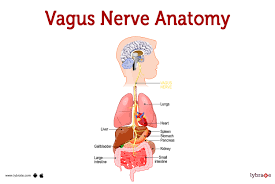The wandering nerve, due to its extensive and comprehensive nerve in the body, extending from the brainstem to the body. It allows the brain to monitor various bodily functions from the neck, chest, abdomen and pelvic region. The vagus nerve travels the chakra system as well, for each spiritual center corresponds to specific organ(s) and nerve plexuses. When we our vagus nerve is correctly activated, we may experience profound spiritual in-sights, or simply be living in the now.
There are multiple nervous system functions provided by the vagus nerve and its related parts. The vagus nerve functions contribute to the autonomic nervous system, which consists of the parasympathetic and sympathetic parts.
The nervous system can be divided into two areas: sympathetic and parasympathetic. The sympathetic side increases alertness, energy, blood pressure, heart rate, and breathing rate.
Theparasympathetic side, which the vagus nerve is heavily involved in, decreases alertness, blood pressure, and heart rate, and helps with calmness, relaxation, and digestion. As a result, the vagus nerve also helps with defecation, urination, and sexual arousal.
Other vagus nerve effects include:
Communication between the brain and the gut: The vagus nerve delivers information from the gut to the brain.
Relaxation with deep breathing: The vagus nerve communicates with the diaphragm. With deep breaths, a person feels more relaxed.
Decreasing inflammation: The vagus nerve sends an anti-inflammatory signal to other parts of the body.
Lowering the heart rate and blood pressure: If the vagus nerve is over-active, it can lead to the heart being unable to pump enough blood around the body. In some cases, excessive vagus nerve activity can cause loss of consciousness and organ damage, our body running on adrenalin.
Fear management: The vagus nerve sends information from the gut to the brain, which is linked to dealing with stress, anxiety, and fear – hence the saying, “gut feeling.” These signals help a person to re-cover from stress-full and/or scary situations.
The Vagus Nerve affects our astral body as well, for the chakra system extends from the brain stem to the pelvic region. Simple yogic exercises can strengthen and balance the Vagus Nerve, activating our ability to relax (even in stressful situations) as well as enhances our ability to absorb our nutrients or enhanced digestion. The Vagus Nerve, when activated, is our body-mind connection or our gut feelings. As animals, our belly or our Solar Plexus, is our innate signal which alerts us to danger (activating our sympathetic nervous system, fight or flight), or simply a state of calm alertness (activating our parasympathetic nervous system).
When our Vagus Nerve is not balanced we may experience the following:
Feeling stressed-out, anxious, over-worked, unable to absorb nutrients, sleep-deprived or insomniac.. The Vagus Nerve dis-order may result in obesity, digestive dis-orders, cardiovascular dis-orders as well as weak kidneys and/or infertility and an in-ability to make decisions.
When our Vagus Nerve is happy and healthy we are infinite in our creative and cognitive abilities.
We easily make decisions and identify or listen to our gut-instinct..
How do we activate our Vagus Nerve?
We have no need to buy anything or go anywhere! Our body-suits are incredible machines, with their own intelligence (as activated by the Vagus Nerve). We can tone and maintain a healthy Vagus Nerve by:
Splashing our face with cold water
Gargling
Full diaphragm breathing or DEERGHA SWASAM the 3 Part Yogic Breath as well as other Pranayama techniques
Singing or Chanting mantra
Exercise
Asanas or the practice of physical yoga postures such as dhanurasana (the bow), navasana (the boat both seated and belly-down), ardha sarvangasana (1/2 shoulderstand)
Feet up the wall (the hips higher than the chest) with full diaphragm breathing




